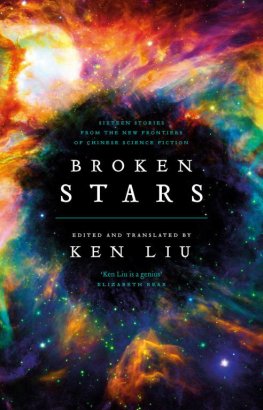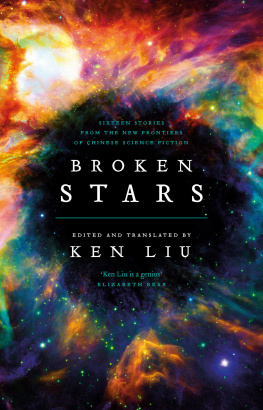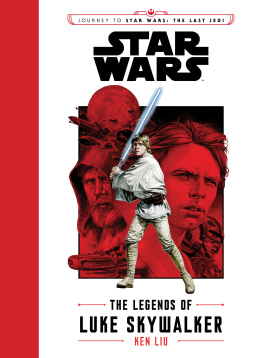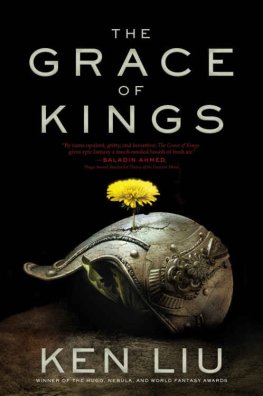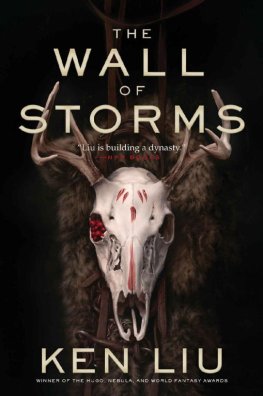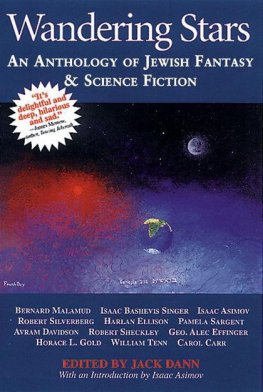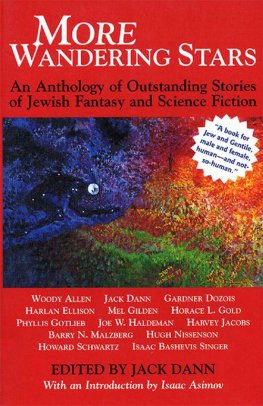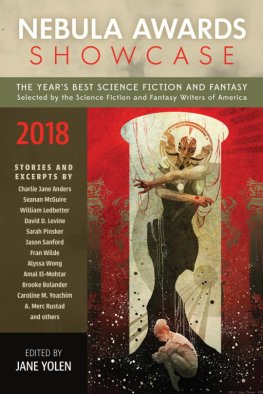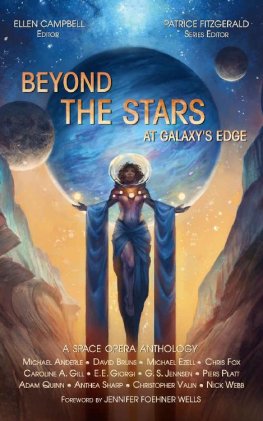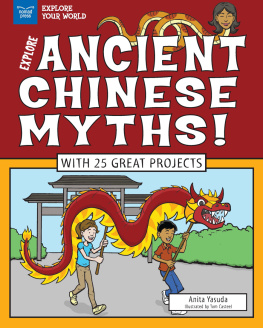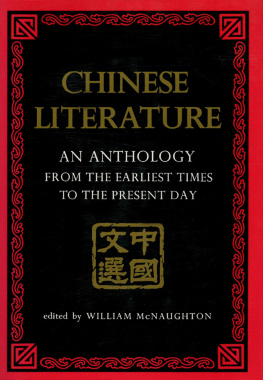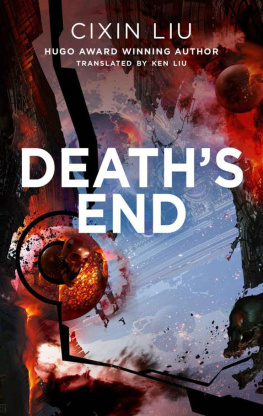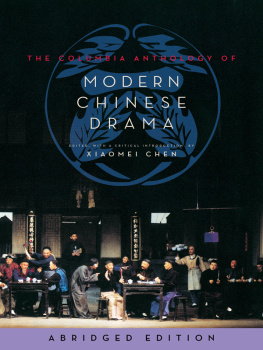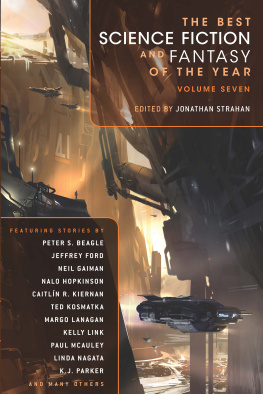BROKEN STARS
CONTEMPORARY CHINESE SCIENCE FICTION IN TRANSLATION
Translated and edited by
Ken Liu
To my authors, who guided me through their worlds

Here are sixteen short stories from Chinas ground-breaking SF writers, edited and translated by award-winning author Ken Liu.
In Hugo award-winner Liu Cixins Moonlight, a man is contacted by three future versions of himself, each trying to save their world from destruction. Hao Jingfangs The New Year Train sees 1,500 passengers go missing on a train that vanishes into space. In the title story by Tang Fei, a young girl is shown how the stars can reveal the future.
In addition, three essays explore the history and rise of Chinese SF publishing, contemporary Chinese fandom, and how the growing interest in Chinese SF has impacted writers who had long laboured in obscurity.
By turns dazzling, melancholy and thought-provoking, Broken Stars celebrates the vibrancy and diversity of SF voices emerging from China.
Since the publication of Invisible Planets in 2016, many readers have written to me to ask for more Chinese science fiction. Liu Cixins Remembrance of Earths Past series (sometimes known as the Three-Body trilogy), praised by President Barack Obama as wildly imaginative, really interesting, showed anglophone readers that there is a large body of SF written in Chinese to be discovered, and Invisible Planets only whetted their appetite.
This has been a gratifying result for me and my fellow translators; fans of Chinese SF; the agents, editors, and publishers who help make publishing translated works possible; and above all, the Chinese authors who now have more readers to delight.
Compared with the first anthology, I curated Broken Stars with an eye toward expanding the range of voices included as well as the emotional palette and the narrative styles. Beyond the core genre magazines, I also looked at stories published in literary journals, on the web, and in gaming and fashion magazines. In total, there are sixteen stories in this anthology from fourteen authorstwice as many as were present in Invisible Planets. Seven of the stories have never been published before in translation, and almost every story was first published in Chinese in the 2010s. I included stories here longer than the longest story in Invisible Planets as well as stories shorter than the shortest story there. I picked established writersthe sardonic, biting wit of Han Song is showcased here in two storiesas well as fresh voicesI think more readers should know the works of Gu Shi, Regina Kanyu Wang, and Anna Wu. I also intentionally included a few stories that might be considered less accessible to readers in the West: Zhang Rans time-travel tale plays with chuanyue tropes that are uniquely Chinese, and Baoshus entry deepens its emotional resonance with the reader the more the reader knows of modern Chinese history.
One regretful consequence of the shift in editorial approach is that Im no longer able to include multiple stories from each author to illustrate their range. I hope that the inclusion of more authors makes up for this lack.
Despite the broader range of authors and stories, I must continue to caution readers that this project is not intended to be representative of Chinese SF, and I make no attempt at curating a best of anthology. Given the diversity of stories that can be called Chinese SF and the heterogeneous makeup of the community of Chinese SF writers, a project that aims to be comprehensive or representative is doomed to fail, and I am skeptical about most methods for picking the best stories.
Instead, the most important criterion I used was simply this: I enjoyed the story and thought it memorable. When wielded honestly, very few stories pass this filter. Whether youll like most of the stories in here will thus have a lot to do with how much your taste overlaps with mine. I dont believe in picking perfect stories; in fact, I think stories that do one thing really well are much better than stories that do nothing wrong. I claim no authority or objectivity, but I am arrogant enough to be confident in my taste.
*
A few quick notes before we get to the stories.
For readers interested in some context on Chinese SF, Ive added three essays at the end from Chinese SF scholars (some of them are also authors). These essays focus on how the rising commercial and popular interest in Chinese SF has affected the community of fans and authors.
As is my standard translation practice, the names of Chinese characters in the stories are rendered in customary Chinese order, with surname first. However, there are some complications when it comes to author names. Reflecting the diversity of self-presentations in the online age, Chinese authors have different preferences for the name theyd like to use in publication. Some authors write under their personal names (e.g., Chen Qiufan) or pen names that are based on their personal names, and so I treat them as standard Chinese personal names. Some authors, however, prefer using an English name for their foreign publications and/or rendering their Chinese name in Western order (e.g., Anna Wu and Regina Kanyu Wang), and in such cases I follow the authors preference. Still other authors write under pen names that cannot be treated as standard Chinese names because theyre allusions or wordplay (e.g., Baoshu, Fei Dao, and Xia Jia), in which case I make a note in the author intro that the name should be treated as a single, indivisible unit (think of these as being somewhat analogous to Internet user IDs).
Unless otherwise indicated, the stories and essays in this volume are all translated by me. (Footnotes will indicate when I collaborated with another translator or when the contribution was originally written in English.) All footnotes should be assumed to have been added by me (or my cotranslator) unless prefaced with Authors note or similar language.
Im grateful to Tor Books in the US and Head of Zeus in the UK for publishing Broken Stars. In particular, at Tor, I wish to thank Lindsey Hall for editorial suggestions, Deanna Hoak as copy editor, Jamie Stafford-Hill for cover design, and Patty Garcia in publicity. At Head of Zeus, I wish to thank Nicolas Cheetham and Sophie Robinson as publishers, Clmence Jacquinet in production, Jessie Price in art, the sales team led by Dan Groenewald, and Blake Brooks in publicity. Without their contributions, this book would not exist or reach you, the reader.
Finally, you can find the original publication information (with author names and story titles in hanzi) as well as copyright notices at the beginning of the anthology.
As an undergraduate, Xia Jia (a pen name that should be treated as an indivisible unit) majored in Atmospheric Sciences at Peking University. She then entered the Film Studies Program at the Communication University of China, where she completed her masters thesis: A Study on Female Figures in Science Fiction Films. Later, she obtained a Ph.D. in Comparative Literature and World Literature at Peking University, with Fear and Hope in the Age of Globalization: Contemporary Chinese Science Fiction and Its Cultural Politics (19912012) as the title of her dissertation. She now teaches at Xian Jiaotong University.
She has been publishing fiction since college in a variety of venues, including Science Fiction World and Jiuzhou Fantasy. Several of her stories have won the Yinhe (Galaxy) Award and Xingyun (Nebula) Award, Chinas most prestigious science fiction honors. In English translation, she has been published in

